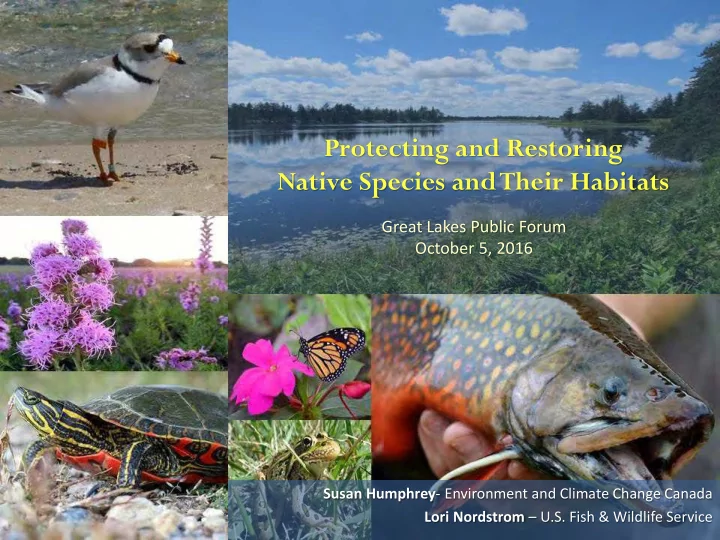

Protecting and Restoring Native Species and Their Habitats Great Lakes Public Forum October 5, 2016 Susan Humphrey - Environment and Climate Change Canada Lori Nordstrom – U.S. Fish & Wildlife Service
What’s the purpose of the Habitat and Species Annex? • “…to contribute to the achievement of the General and Specific objectives of the Great Lakes Water Quality Agreement by conserving, protecting, maintaining, restoring and enhancing the resilience of native species and their habitat, as well as by supporting essential ecosystem services.” 2
Great Lakes Habitat: Vast and Varied 3
Great Lakes Habitat: A Home to a diversity of Species Muskrat Piping plover Spotted gar Five-lined skink American eel 4
Great Lakes Habitat: Provides Multiple Ecosystem Services • Spiritual connection • Recreational benefits • Water for 40 million people, and hundreds of thousands of businesses • The largest freshwater coastal wetland system on Earth 5
Great Lakes Habitat: A Changing Region, Changing Habitat Large historic changes in biodiversity and habitat from: • Unsustainable use of natural resources • Habitat modification • Habitat degradation from pollution • Invasive species 6
Great Lakes Habitat: Growing Risks to Native Species Current threats to native species from changes to : Habitat Food web Water chemistry Water levels Physical processes Industrial and Urban Development Changing Climate 7
Great Lakes Water Quality Agreement: Providing a Basinwide Perspective on Habitat Activities 8
Great Lakes Water Quality Agreement A Timely Addition To Do: Habitat Conserve Protect Maintain Restore Enhance The 2012 amendment was expanded to include greater attention to habitat with specific commitments focused on habitat and species. EPA Administrator Lisa Jackson (R), and Canadian Environment Minister Peter Kent (L) 9
Biodiversity Conservation Strategies: Communities Plan to Conserve Habitat and Species 10
Biodiversity Conservation Strategies: Plans lead to Action 11
Net Habitat Gain: Expanding Habitat Extent & Improving Condition Monoculture of Phragmites 12
Net Habitat Gain: The Baseline Habitat Survey Georgian Bay Wave Energy Lake Huron Bathymetry Lake Erie Chlorophyll a levels 13 Lake Erie Secchi Depth
Net Habitat Gain: Linking Habitat to Species 14
Local Actions Making a Difference 15
Priorities for the next 3 years: Starting the Survey and Aligning Programs Priority for Action: Priority for Science: • Review gaps and • Pilot and testing of the priorities identified by Baseline Habitat Survey existing strategic plans on a regional scale • Develop a binational framework for prioritizing activities to conserve native species and habitat 16
Thank you Closing Slide 17
Recommend
More recommend